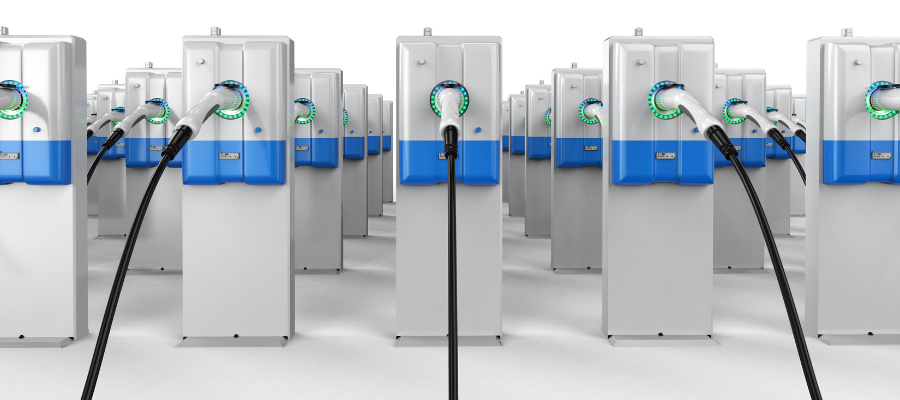🕒 Article read time: 2 minutes
Leading the charge

A comprehensive and reliable public electric vehicle (EV) chargepoint network is critical if the logistics sector is to play its role in helping tackle the climate crisis, reduce carbon emissions and achieve net zero by 2050.
It is also a vital prerequisite to encouraging greater adoption of EVs ahead of the 2030 deadline ending the sale of new petrol and diesel vans.
CHARGEPOINTS INCREASE BY MORE THAN A THIRD
Figures released in October 2022 by the Department for Transport show a 34% increase in public EV chargepoints since 1 October 2021, with the total number reaching 34,637. However, Taking charge: the electric vehicle infrastructure strategy report, published by HM Government in March 2022, notes that government has predicted the UK will require at least 300,000 charge points by 2030; a significant increase on the current figure. While the public infrastructure is growing, the pace of the roll out needs to be much quicker in order for the network to be ready for mass electric vehicle adoption.
ACCOMMODATING COMMERCIAL VEHICLES
In addition to a significant acceleration in the number of chargepoints installed in the next few years, it is also vital that public chargepoint infrastructure development plans recognise the needs of all commercial vehicles at this early stage, to avoid costly alterations to chargepoint facilities across the public charging network at a later date. Usually taller and larger than cars, commercial vehicles often carry external equipment. This means that many public chargepoints are inaccessible to the very vehicles that keep local communities and economies supplied and serviced. Logistics UK is calling on government to ensure public chargepoint spaces have sufficient headspace, are large enough to accommodate commercial vehicles, have long reaching cables and simple billing systems that accept fuel cards used by commercial vehicle operators – not just contactless payment systems.
BUILDING A NETWORK THAT WORKS FOR EVERYONE
In December 2022, the government published its Getting to the Point: Accelerating EV chargepoint rollout through geospatial data report on how location data can help build an electric vehicle charge point network that works for everyone, everywhere.
Denise Beedell, Senior Policy Manager, Logistics UK, said: “Logistics UK welcomes this report which calls for an increase in the number of chargepoints to support the move to electric. However, it is disappointing that there is little mention of the needs of large vans and other commercial vehicles that will also rely on access to the public chargepoint network. Moving forward, clear targets are required on how, where and when the supporting infrastructure will be implemented.”
EV USAGE DATA MUST INFORM POWER SUPPLY
If the transition to net zero is to be achieved within the deadlines, harnessing EV usage data and encouraging innovative charging technology will be vital for ensuring adequate power supplies in the right locations. This will be important for the development of the public charging network, as well as supporting operators whose fleets return to depots.
THE NEED TO UPGRADE POWER SUPPLIES
One issue that is becoming increasingly apparent to many fleet operators is that power supplies at their depots are likely to be insufficient for their vehicle fleet’s future charging needs. Costs of over £1m to increase the power supply capacity have been reported, which for many operators is simply not commercially viable, especially if premises are leased.
“At Logistics UK, we are calling for a fair and equitable apportionment of the costs of increasing energy supply to commercial vehicle operators’ premises,” Beedell said, “to make power supply capacity increases more affordable.”
LOGISTICS SECTOR KEEN TO PLAY ITS PART
With climate change one of the most pressing challenges facing the global community, logistics businesses are already adapting to meet the UK’s decarbonisation agenda and are committed to making significant changes to the way they operate. However, the scale of the task and the risk of missing the target should not be underestimated.
“The logistics industry wants to play its part in the journey towards net zero and knows the government cannot provide all the answers,” Beedell concluded, “But with the right policies and incentives which recognise and support the needs of the logistics sector for the transition to net zero, the sector will be able to play its part in meeting the net zero challenge.”
*www.logistics.org.uk/environment
Published On: 26/01/2023 16:00:48

Comments Section
If you are a Logistics UK member login to add comments.